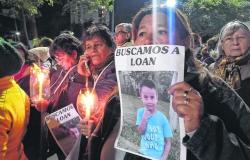Embed
The delegation of powers to the Executive Branch, the Investment Promotion Regime (RIGI) to attract fresh dollars, the privatizations of public companies, the restitution of the income tax on the highest salaries, and money laundering, are the chapters of the Bases Law and the package of fiscal measures that generate greater debate and that may undergo new changes in the treatment, in particular, of these two key initiatives for the National Government.
In any case, the benches that will support the majority opinion have already assured that the National Council for Scientific and Technical Research (CONICET) will be maintained; the National Administration of Laboratories and Health Institutes “Dr. Carlos G. Malbrán” (ANLIS); the National Administration of Medicines, Food and Medical Technology (ANMAT); the Industrial Property Institute (INPI); the National Institute of Cinema and Audiovisual Arts (INCAA); National Communications Entity (ENACOM); the Nuclear Regulatory Authority (ARN), the National Commission for Space Activities (CONAE) and the National Data Bank.
HOW WILL THE VOTING BE?
Both the Base Law and the fiscal package They will be debated separately and the vote will be by chaptersas the discussion was diagrammed in the Senate chamber during the parliamentary work meeting led on Monday by the vice president and head of the Senate, Victoria Villarruelwith the heads of the blocks.
In the conclave, the presidents of the spaces agreed that they will have 10 speakers per block in the section that will include the Bases law. Peronism, which is divided into two blocks, but functions as an interblock in practice, will also adjust to the proposal made by the ruling party.
That is, the Citizen Unity block, which leads Juliana Di Tullio (Buenos Aires), and the National and Popular Front, which leads Jose Mayans (Formosa), the 10 speeches of a total of 33 senators who make up both spaces will be distributed. On the other hand, In the fiscal package the list of speakers is reduced to 5 per block with the same logic as in Bases.
To this will be added the closing speeches of the presidents of the blocks and reporting members. At the same time, they do not rule out that the session could be divided into two parts with a intermediate room as happened in the Lower House during the debate on the Mother Bases law, last February. “
In this context, it is expected that the discussion of the Bases law, prior to the start of voting in general and in particular, respectively, lasts more than 6 hours. Therefore, The voting process would extend until the end of Wednesday. This scenario highlights the idea of an eventual interim quarter that would be resumed with the debate on the fiscal package on Thursday.
HOW EACH BLOCK WILL VOTE
The session was at risk yesterday afternoon, when the people of Santa Cruz José María Carambia and Natalia Gadano They announced that they will not give a quorum. Under this scenario, the beginning of the session was left in the hands of the radicals Maximiliano Abad and Martin Lousteau, holder of the centenary match. The first slipped that he will help, while the second confirmed his presence to defend his minority opinions. Thus, the meeting at the venue would begin with 37 legislators on their seats, the minimum necessary to activate the invitation.
The main opposition, dominated by Kirchnerism, has 33 votes inclined to reject the initiative. They will be joined by the radical senator Martín Lousteau, who will defend his own opinion. On the other hand, the ruling party has articulated, through multiple concessions, a bloc of 35 legislators willing to generally endorse the project. The result, then, depends on the conduct of three senators who until now have not communicated their decision: the radical Maximiliano Abad and the Santa Cruz residents José Carambia and Natalia Gadano.
A rejection would overthrow the law and would be a huge political defeat for the Government. If, however, it is approved in general, a long discussion about the articles will follow. If it is validated, it will return to the Chamber of Deputies since the opinion under discussion is different from the one that reached the Senate with half a sanction.
IN FAVOR (35):
PRO (6):
-Carmen Rivero
-Martin Goerling
-Alfredo De Ángeli
-Luis Judge
-Victoria Huala
-Guadalupe Tagliaferri
UCR (11)
-Eduardo Galaretto
-Pablo Blanco
-Mariana Juri
-Flavio Flame
-Carolina Losada
-Daniel Kroneberger
-Rodolfo Suarez
-Stella Maris Olalla
-Gabriela Valenzuela
-Eduardo Vischi
-Victor Zimmerman
LIBERTARIANS (7):
-Bartolomé Abdala
-Ivana Arrascaeta
-Ezequiel Atauche
-Vilma Bedia
-Bruno Olivera
-Juan Carlos Pagotto
-Francisco Paoltroni
“DIALOGIST” FEDERALISMS (11):
-Carlos Espínola
-Eduardo Kueider
-Alejandra Vigo
-Beatriz Ávila
-Carlos Arce
-Sonia Decu
-Andrea Cristina
-Lucila Crexell
-Juan Carlos Romero
-Edith Terenzi
-Monica Silva
AGAINST (35):
UNION FOR THE COUNTRY (33):
-Eduardo de Pedro
-Guillermo Andrada
-Martín Donate
-Lucía Corpacci
-Anabel Sagasti
-Juliana Di Tullio
-Celeste Navarro
-Eugenia Duré
-Sergio Leavy
-Silvina Larraburu
-Carlos Linares
-Nora del Valle Giménez
-Cristina Lopez
-Alicia Kirchner
-Carolina Moisés
-Oscar Parrilli
-Fernando Salino
-Silvia Sapag
-Daniel Bensusán
-Juan Manzur
-Florencia López
-Sandra Mendoza
-Jose Mayans
-Gerardo Montenegro
-María Teresa González
-Marcelo Lewandowski
-Jose Neder
-Mariano Recalde
-María Piatti Vergara
-Antonio Rhodes
-Fernando Regal
-Claudia Zamora
-Sergio Uñac
ALLIANCE FOR SANTA CRUZ (2):
-Jose Carambia
-Natalia Gadano






